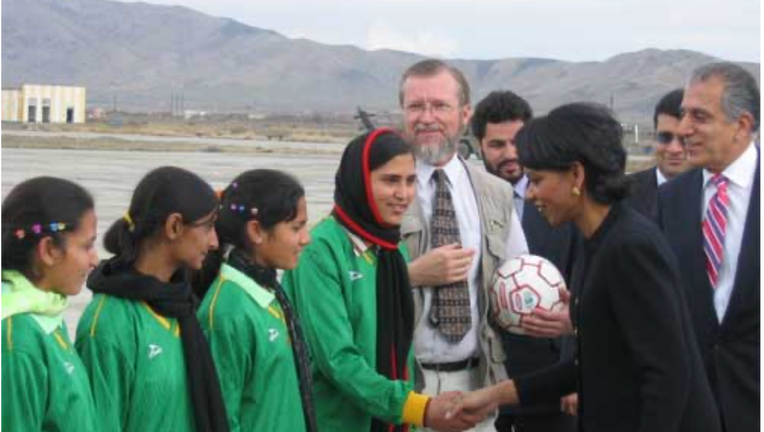Former Afghan soccer player now in Bay Area fears for those under Taliban rule

Condoleeza Rice pictured with members of Roots of Peace woman's soccer team in 2005. The photo was taken in Kabul, Afghanistan. (Provided by Roots of Peace)
SAN RAFAEL, Calif. - An Afghan woman now living in the Bay Area said her family back home received a text message purportedly from the Taliban threatening to harm her loved ones as the militant group asserts control over the country, after a near-complete takeover.
"They are going after my family," said Bibi Kawser Amine, a former Afghan soccer player who's been living in Concord after obtaining a green card. "My family got a warning, my mom, dad, and two sisters who are behind."
Amine said the message was clear: "'We are going to kill you guys.'"
She explained that the Taliban's scare tactic is an attempt to dissuade her sister from going to college. She's felt their pressure too. In the early 2000s, Amine was one of the few women playing amateur soccer in the country. That sports breakthrough earned her team a visit with former National Security Advisor Condoleeza Rice, a cherished memory, but it also made her an enemy of the Taliban.
Now, 7,000 miles away from her home, Amine works for an organization providing aid to Afghanistan.
The threat to Amine's family is not unique, countless other families have received similar dire warnings.
The Taliban's lightning-fast capture of the capital Kabul and other major cities in a matter of days came as the U.S. ends its military presence in Afghanistan after 20 years.
The U.S.'s withdrawal, at the direction of President Joe Biden, has left Afghanistan in chaos, with thousands trying to flee.
SEE ALSO: Bay Area's 'Little Kabul' feels heartbreak over turmoil in Afghanistan
Since their conquest of Afghanistan in recent days, the Taliban have sought to portray themselves as more moderate than when they imposed a strict form of Islamic rule in the late 1990s. But many Afghans remain skeptical.
Older generations remember the Taliban’s previous rule, when they largely confined women to their homes, banned television and music, and held public executions, according to the Associated Press. A U.S.-led invasion drove the group from power shortly after 9/11.
While Amine was able to escape, she fears for those in her native country.
"I get about 100 messages and calls from people back home. They tell me the Taliban is coming looking for people in the government. They are not safe," she said.
And asked whether she would tone down her advocacy given the alleged threat her family received.
"This is not the time to stay quiet," she said, pointing to the girls and women falling back under Taliban rule.. "I'm willing to sacrifice myself."
Amine's deep ties to Afghanistan are driving forces behind her work with, Roots of Peace, a nonprofit organization based in San Rafael that has created thousands of jobs in the war-torn land through agriculture and exporting. Amine is a senior program specialist for Roots.
The organization, which is led by its co-founder Heidi Kuhn, has been pleading for the U.S. to help evacuate 360 of its Afghan employees.
Roots of Peace has been operating in Afghanistan since 2003 and over the years has has been able to operate in provinces that the Taliban controlled. But that coexistence is in doubt now that the Taliban has seized power and now controls all major border crossings.
"This is a catastrophe beyond the lens of a camera out the airport," Kuhn said referring to the images of Afghans, clinging to planes and desperately trying to flee the country.
Kuhn said her employees and other displaced Afghans are "scared to death and living on the streets."
Kuhn said politics isn't the crux as a humanitarian crisis brews, world peace is.
Calling for U.S. support Kuhn said, "We need your help. We need back up for peace." Later adding, "We got a job to do and that is cultivating roots of peace on earth."
While the US. troops have rescinded, Kuhn reassures that her organization is not abandoning its mission, which is to create peace through agriculture and economics.
She said she wants her at-risk employees evacuated, but with fewer hands in the fields, the harvest could go to waste.
"Eighty percent of the country depends on agriculture for jobs. If we ignore the harvest, then we are going to have one of the worst humanitarian crises."
Roots of Peace is accepting donations and all proceeds will go toward displaced Afghans as they look for light on the other side of a dark tunnel.

